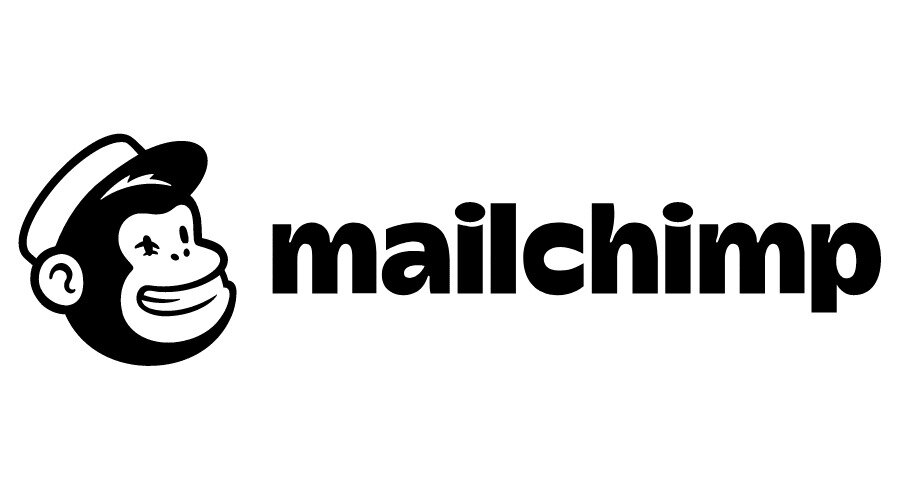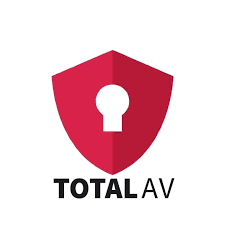Privacy Canada is community-supported. We may earn a commission when make a purchase through one of our links. Learn more.
Betternet VPN Review (2025)

Free VPNs rarely offer true value (compared to paid services).
In fact, they usually aren’t truly free at all… They inundate you with advertisements, sell your data to any bidder and tend to be less secure than paid VPNs.
Betternet describes itself as a “free” VPN, and although they claim to be different from other free options, a closer look reveals that this may not actually be the case. They are a relatively new player in the market, having just come on the scene in 2015. However, because their service is free, they do have a rather large number of users.
Many of these users are running Android devices, but the company also supports devices that run Mac, Windows and iOS. Betternet similarly has extensions for Firefox and Chrome users. There’s no need to register, so the company does not even collect your personal data.
Nonetheless, it stands to reason that Betternet must be turning a profit somehow. They are not an altruistic organization that exists solely for the improvement of humankind. Through videos and affiliate apps, Betternet earns their money.
When you log onto Betternet, the company earns a profit each time you click on “Watch a Video and Connect” or “Install an app.” Apparently, these profits were not quite enough to keep things going.
By the end of 2017, Betternet had launched a Premium version of its most popular mobile app. Included in the Premium plan is access to dedicated servers, customer support on a 24/7 basis and more IP choices. This package gives you the ability to connect to 11 servers in 10 countries.
If 11 servers in 10 countries doesn’t sound particularly impressive to you, that’s because it isn’t. Most high quality VPNs boast networks of thousands of servers that stretch across more than 100 nations.
Take NordVPN for example, they have over 5,000 servers in about 100 different countries. Almost regardless of where you are in the world, you can find a server that is close to your geographic location. That nearly always guarantees faster data transfer rates and better overall performance.
The other less-than-impressive news is that Betternet operates more like a proxy server than a true VPN. Proxy servers can be an acceptable alternative to VPNs when you are engaged in certain low-risk activities that don’t necessarily require encryption. When you use a proxy server, it merely makes you look like your geographic location is other than what it actually is.
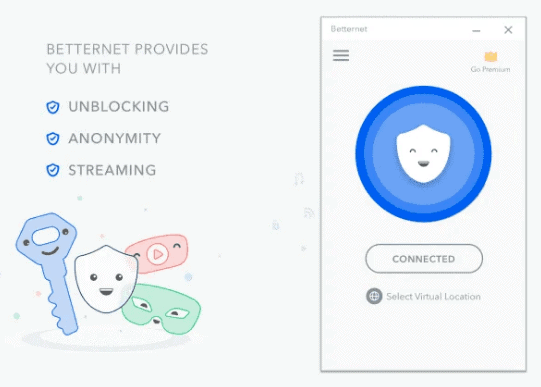
If you want to watch region-blocked content on YouTube, a proxy server is fine. However, if you want to do just about anything else, then it is far better to have a VPN that encrypts all of your web traffic in addition to making it appear as if you are browsing from somewhere else. This protects your sensitive data far better, leaving you less vulnerable to prying eyes and hackers.
Being based in Canada, Betternet is a local player in the VPN marketplace. While some may see this as a plus, others will be less impressed. Canada is a member of the Five Eyes spy network along with the US, the UK, Australia and New Zealand.
With their penchant for sharing data, should one of the government agencies get their hands on your personal data, you can be certain that all of the rest will soon have it too. This isn’t the best state of affairs for someone trying to maintain a low profile.
Betternet may be an acceptable choice if the price is your concern above all else. Just be aware that you won’t have access to all features or even all servers unless you pay for a premium membership. You’re going to see a lot of ads with this service, so if that is a turn-off for you, then seeking one of the best VPNs for Canada may be a good idea.
Security and Encryption
The best VPNs openly brag about their security and encryption protocols, but not Betternet. They really make you search to figure out what, if any, VPN protocols are used and what kind of encryption users can rely upon.
A 2015 blog entry provides some enlightenment.

While OpenVPN is widely considered to be the industry standard when it comes to VPN protocols, Betternet’s literature does not clarify precisely when it is used. The blog post additionally mentions AES 256-bit encryption. Again, this is considered industry standard, but Betternet fails to mention when and how this encryption is applied in their services.
Betternet appears to also make IPSec VPN protocols available with 128-bit encryption. However, offering just two VPN protocols is quite limited when compared with other companies. Since OpenVPN is considered the best in the business, it is quite likely nothing else is needed for most users.
Little is mentioned with regard to security on the Betternet website. This serves as further evidence that this service functions more as a proxy than as a true VPN. Keep in mind that there is no router support and that it likely will not be clear when you’re using OpenVPN and when you’re using IPSec.
It also may be worth noting that Betternet figured rather prominently in an academic study that was released in 2017. Part of the study involved looking at whether or not VPNs were providing the level of security that they were advertised to be doing.
The study also suggested that these VPNs may be injecting adware or malware onto user devices. Rankings used in the study placed Betternet among the 10 worst for these activities.
While not necessarily positive proof that using Betternet will leave your devices loaded down with adware and malware, the study certainly is suggestive. Additionally, many of the other 10 most suspect VPNs on the list are no longer in service. It is difficult to say at this point if Betternet will enjoy a brighter future.
Betternet’s Server Locations
Betternet has an extremely limited server network. Servers are located in Canada, the US, the UK, Japan, France, Australia, Germany, Singapore, Hong Kong and the Netherlands. If you go for free access, you do not get to choose to which server you will be connected.
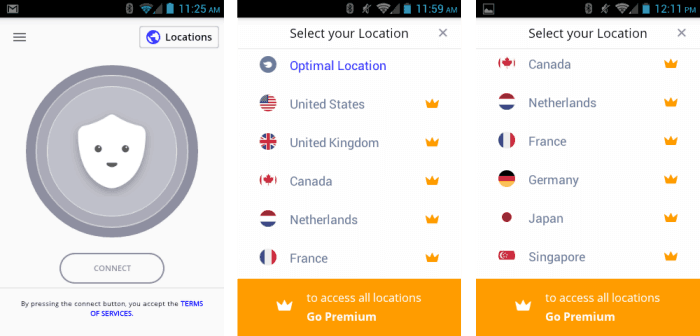
The premium membership gives you more choices, but the network still is severely limited. With competitors offering literally thousands of servers in more than 100 nations across the globe, Betternet simply cannot compete. Additionally, Betternet’s paid service is more expensive than some of the best VPNs available today.
Using BitTorrent or P2P with Betternet VPN
Torrents and P2P are not strictly forbidden on Betternet’s servers. However, their speed test results are so abysmally slow that it would take days to download a file of any size. Although downloading of torrents is allowed, Betternet also cautions on their website that they will do their utmost to comply with any warrants or other official requests.
The incredibly slow data transfer rates also mean that streaming via Netflix or any similar service is virtually impossible. If streaming is at all important to you, then it is vital that you go with one of the top VPNs that makes streaming easy like Surfshark, which has dedicated servers for unblocking geo-restricted content to make your streaming and browsing experience more seamless.
Betternet VPN’s Speed Test Results
Betternet is typically slow, there is really no other way to say it. Speed test results show a download speed of 3.18 Mbps and an upload speed of 12.41.

Those results are a bit depressing. Considering the unknown levels of security and encryption that you’re dealing with as well, it is easy to see that you are just not getting much when you use Betternet. That’s even if you decide to spring for the paid plan, which seems overpriced considering the lack of features and the generally poor performance.
Betternet VPN’s Logging Policy
One thing that Betternet gets right is its strict no logs policy. Because it is not necessary for free users to even register with the service, it stands to reason that they could have little data to share or that could be vulnerable to hackers.
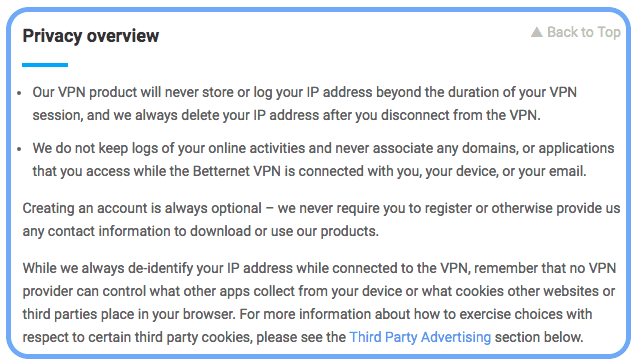
It’s nice to see that as soon as you close your browsing session, all history of it is deleted. That is simple and straightforward. Another plus is that any information that is gathered for that short time is not shared or forwarded to any third parties or affiliates.
The best part of their zero log policy is that if Betternet ever receives a DMCA takedown notice, they will not be able to share user information. The DMCA stands for Digital Millennium Copyright Act.
DMCA protects text, photos, videos and other content in the online realm. When the owner of the copyrighted material believes that their rights have been violated, they can serve a takedown notice to the alleged violator. These takedown notices also may be served on ISPs and VPNs that may have been used to access the violated website.
If the VPN is logging data about users and their activities, then they must comply with a request for information regarding a DMCA infraction. VPNs that do not keep records have little data to give. In this respect, Betternet is doing precisely what they should be doing.
Pricing Options for Betternet VPN
Of course, Betternet’s most popular option costs nothing at all. With incredibly slow upload and download speeds and only a handful of servers available, this is unlikely to be an attractive option for many people, especially when considering the company’s questionable security tactics.
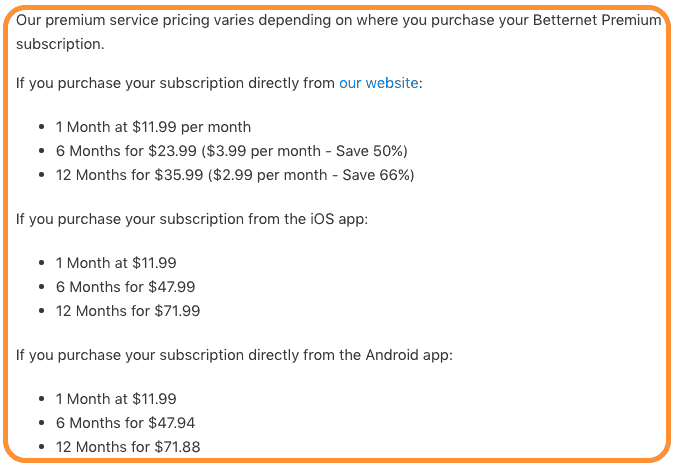
The premium, paid plan isn’t much better. You can pay on a month-by-month basis, but the cost is an alarming $11.99 per month. That is far more than the price charged by far superior, true VPN services.
If you opt to pay for one year in advance, the price becomes far more attractive. At $2.99 per month, the cost of the service is brought down closer to its true value, though even this price may be inflated.
Is Betternet VPN Recommended?
One thing that Betternet has in its favor is that it’s extremely simple to use. No degree of sophistication or experience is required to understand the service’s basic functions. Of course, it helps that Betternet’s functions are really basic.
There aren’t any bells and whistles here, and a review of their website demonstrates too little information with regard to security and encryption. It just is not possible to tell when OpenVPN is being used instead of IPSec. Consequently, there’s no real way to know if you’re getting 256-bit encryption or 128-bit encryption.
Perhaps that is because Betternet is not a true VPN at all. It offers only the most basic protection. Plus, as is demonstrated by the 2017 academic study, there are some questions related to the company’s use of adware and malware.
Even if they aren’t infecting your devices with things that you’d rather not have, the experience with the free version of the service is loaded with advertisements already. It’s a tiresome slog, and it’s unclear how you really benefit from it.
If you are genuinely concerned about your privacy and security when online, then it is advisable to go with a top VPN that has good reviews and impressive speed for data transfers. NordVPN and Surfshark both are precisely that kind of service.
These heavyweights always let you know where you stand. You know which VPN protocol you’re using, and you know exactly what level of encryption your web traffic is going through. That gives you the kind of peace of mind that you just won’t get with a service like Betternet.
Use Betternet if you’re in a pinch at the local coffee shop and you just need to do something innocuous like look at a YouTube video. The service generally is not recommended for anything else that might reveal more about your online habits or potentially put your financial or personal data at risk.



